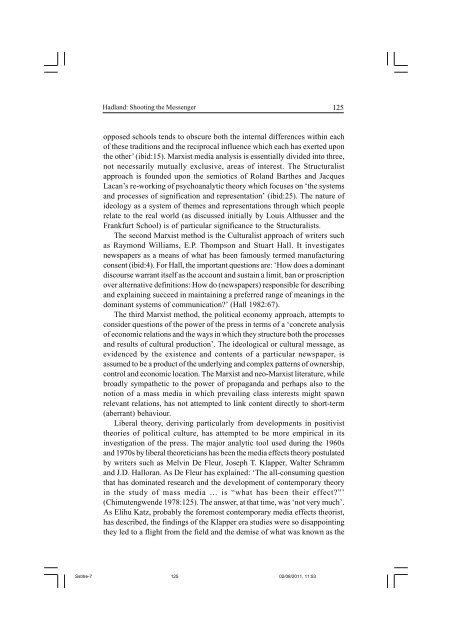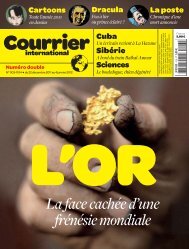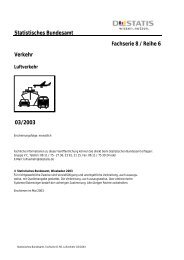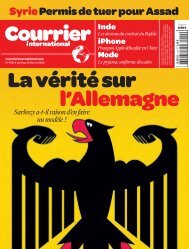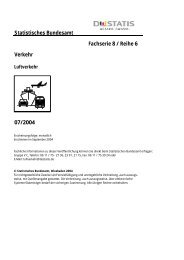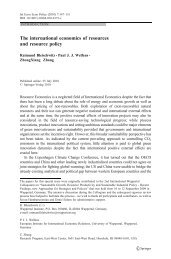lieux (publics) de ville » par les mots ou comment les murs - Index of
lieux (publics) de ville » par les mots ou comment les murs - Index of
lieux (publics) de ville » par les mots ou comment les murs - Index of
You also want an ePaper? Increase the reach of your titles
YUMPU automatically turns print PDFs into web optimized ePapers that Google loves.
Hadland: Shooting the Messenger<br />
125<br />
opposed schools tends to obscure both the internal differences within each<br />
<strong>of</strong> these traditions and the reciprocal influence which each has exerted upon<br />
the other’ (ibid:15). Marxist media analysis is essentially divi<strong>de</strong>d into three,<br />
not necessarily mutually exclusive, areas <strong>of</strong> interest. The Structuralist<br />
approach is f<strong>ou</strong>n<strong>de</strong>d upon the semiotics <strong>of</strong> Roland Barthes and Jacques<br />
Lacan’s re-working <strong>of</strong> psychoanalytic theory which focuses on ‘the systems<br />
and processes <strong>of</strong> signification and representation’ (ibid:25). The nature <strong>of</strong><br />
i<strong>de</strong>ology as a system <strong>of</strong> themes and representations thr<strong>ou</strong>gh which people<br />
relate to the real world (as discussed initially by L<strong>ou</strong>is Althusser and the<br />
Frankfurt School) is <strong>of</strong> <strong>par</strong>ticular significance to the Structuralists.<br />
The second Marxist method is the Culturalist approach <strong>of</strong> writers such<br />
as Raymond Williams, E.P. Thompson and Stuart Hall. It investigates<br />
newspapers as a means <strong>of</strong> what has been fam<strong>ou</strong>sly termed manufacturing<br />
consent (ibid:4). For Hall, the important questions are: ‘How does a dominant<br />
disc<strong>ou</strong>rse warrant itself as the acc<strong>ou</strong>nt and sustain a limit, ban or proscription<br />
over alternative <strong>de</strong>finitions: How do (newspapers) responsible for <strong>de</strong>scribing<br />
and explaining succeed in maintaining a preferred range <strong>of</strong> meanings in the<br />
dominant systems <strong>of</strong> communication?’ (Hall 1982:67).<br />
The third Marxist method, the political economy approach, attempts to<br />
consi<strong>de</strong>r questions <strong>of</strong> the power <strong>of</strong> the press in terms <strong>of</strong> a ‘concrete analysis<br />
<strong>of</strong> economic relations and the ways in which they structure both the processes<br />
and results <strong>of</strong> cultural production’. The i<strong>de</strong>ological or cultural message, as<br />
evi<strong>de</strong>nced by the existence and contents <strong>of</strong> a <strong>par</strong>ticular newspaper, is<br />
assumed to be a product <strong>of</strong> the un<strong>de</strong>rlying and complex patterns <strong>of</strong> ownership,<br />
control and economic location. The Marxist and neo-Marxist literature, while<br />
broadly sympathetic to the power <strong>of</strong> propaganda and perhaps also to the<br />
notion <strong>of</strong> a mass media in which prevailing class interests might spawn<br />
relevant relations, has not attempted to link content directly to short-term<br />
(aberrant) behavi<strong>ou</strong>r.<br />
Liberal theory, <strong>de</strong>riving <strong>par</strong>ticularly from <strong>de</strong>velopments in positivist<br />
theories <strong>of</strong> political culture, has attempted to be more empirical in its<br />
investigation <strong>of</strong> the press. The major analytic tool used during the 1960s<br />
and 1970s by liberal theoreticians has been the media effects theory postulated<br />
by writers such as Melvin De Fleur, Joseph T. Klapper, Walter Schramm<br />
and J.D. Halloran. As De Fleur has explained: ‘The all-consuming question<br />
that has dominated research and the <strong>de</strong>velopment <strong>of</strong> contemporary theory<br />
in the study <strong>of</strong> mass media … is “what has been their effect?”’<br />
(Chimutengwen<strong>de</strong> 1978:125). The answer, at that time, was ‘not very much’.<br />
As Elihu Katz, probably the foremost contemporary media effects theorist,<br />
has <strong>de</strong>scribed, the findings <strong>of</strong> the Klapper era studies were so disappointing<br />
they led to a flight from the field and the <strong>de</strong>mise <strong>of</strong> what was known as the<br />
Sstitre-7 125<br />
02/08/2011, 11:53


